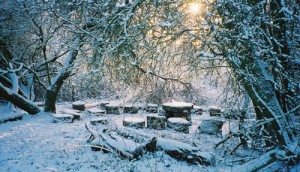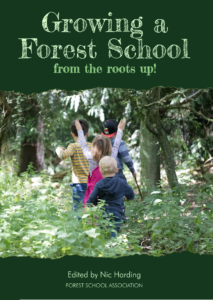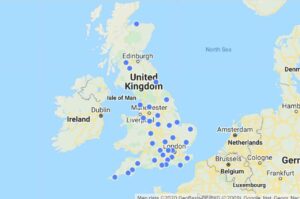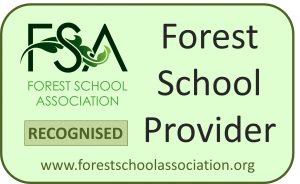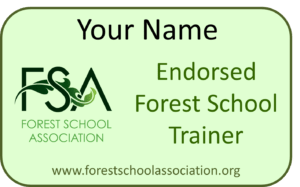This is the first article in a new guest blog. Members are invited to submit articles to the FSA via gareth@forestschoolassociation.org . They can relate to anything and everything Forest School. All articles need director approval to be published but the content will not be edited or modified in any way. Views expressed in the guest blog are not necessarily those of FSA directors or represent FSA policy.
“civilization is a race between education and catastrophe.” H.G.Wells
This has been a strange year – like no other I have lived in. I have just returned from a ‘different’ nativity in a Forest School site at a school in Kidderminster, and I am full of ‘glow’. Working with this school on a whole school approach and how to integrate outdoor learning and the FS philosophy this term has given me hope in amongst the weird and, to be honest, scary global political processes of 2016. A complete contrast to the narrative and totally combative, ‘unreal’ processes, we have witnessed in various election and referenda of 2016, with, to be honest, some really skewed values being transmitted from all sides of the arguments. And I have to say I am still reeling from the morning’s news from across the Atlantic on November 8th 2016. The question I keep coming back to is how has the democratic process come to be so unreal, aggressive and based on ‘thin’ argument. On November 9th, when running a challenging behaviour course in the outdoors, there couldn’t have been a greater irony – the challenging behaviour displayed by all political parties in both the European referendum and the US elections in 2016 had to be seen to be believed. Every one of the educators I worked with on that day expressed the same sadness, fear and anxiety and, to be honest, incredulity. How have we got to this atmosphere of ‘cult’ personality, rather than real conscious deliberating over issues facing humanity on this one planet we all share? What does this and the current zeitgeist of populism, isolationism, racism, separation, disconnection from truth and reality – especially when it comes to climate change, in fact disconnection from planetary life and humanity, mean to our practise as educators??
Surely, even more than ever, in these times of change and scariness we need to be preparing all learners, and that means teachers and pupils, Forest school leaders and forest schoolers (this is not to say that forest school leaders aren’t also forest schoolers!), to be able to consider the issues facing us all – critically and with respect. One of the themes that has come up this year around the campfire, with learners I have had the privilege to work with, is isolationism. On the challenging behaviour course our political leaders were inevitably talked about and by directly linking into the elements, life and our fellow learners/educators we are providing another narrative by connecting into the ‘real’ of the natural world and offering a space for serious, respectful reflection. In the last few of weeks the media have decided to project on to the world the tragedy of Allepo and I have had communications from a Canadian FS practitioner, Bonnie, who runs an early years nature school and is finding it hard to focus on their celebration of the learning and Christmas joys in the woods. My reply to Bonnie is to connect into the gifts of moment and the ‘real’ at FS, while acknowledging the despair that the other ‘real’ stuff happening elsewhere in the world provokes within us. Adam Lefstein in the latest Cambridge Primary Review blog eloquently pointed to how we should react and be as educators;
“…, in order to learn how to discuss them (current issues) democratically: that is, respectfully, with people we disagree with, based on evidence and argument, and with a genuine openness to hear, consider, and try to address the others’ concerns. Furthermore, if Postman’s analysis (in his book – Amusing Ourselves to Death about how the media distorts the truth), is on target, pupils also need to learn to look critically at the media environment: to become accustomed to assessing the quality of claims, to develop awareness of how they’re influenced, and to go beyond the identification of the features of different genres (as is currently popular) to assess their advantages and limitations. I suggest these practices not as another supplement to an already crowded curriculum, but as principles for the teaching and learning of existing texts and topics.”
This is not to say that we open up the horrors of Allepo in our Forest Schools with early years, but if it comes up then how do we tackle what is coming through our screens. If Forest School is truly learner centred and aiming for full participation in the education process from all – ie children and adults alike, then where better to have respectful open dialogue than around the fire about what is on learner’s minds. FS leaders have said to me in the past – is this the place to bring in politics? My answer being that by the very fact that you are working with children’s interests, feelings and motivations and taking them seriously then that is politics. The current political discourse is surely on our learners minds and making links to the truths of the natural world and Forest School community – the way we conduct ourselves at FS, is the antithesis of the european referendum, the American election process and the really ‘hard to get a handle on’ perspectives on middle eastern politics. One child stated recently in a FS session – “this is so much better than telly”. This got me thinking that reality and first hand experiential learning is indeed the antidote to reality TV (and I don’t just mean soaps and X factor but also the news and projection of our politics on the screen). It is not only good for our well being but also our perceptions of what is and isn’t ‘true’. Politicians use words to manipulate, and the media is much the same. However as educators our words should be, as far as possible, free of judgment, especially when working with behaviour that might challenge us, and we need to be full of connection and empathy – a basic tenet of Forest School. That doesn’t mean we don’t display our feelings, and describe these to our learners, but we need to own them and use language that is not prejudice but still congruent, verbal and non verbal. This needs to be done and modelled in a way that still means as educators we ‘hold’ the space for free open dialogue and the display of emotions that the politics of the day may evoke. To show we are a human with all our vulnerabilities and anxieties and one that has an equal right to be part of the FS community and other communities, is to know that we can speak up despite our foibles, failures, fears and anxieties and be accepted without slur ie to be able to enter the arena (as Roosevelt so eloquently put it in his citizenship in a republic speech in 1910). ‘Holding the space’ IS ‘holding the arena’. This responsibility of the FS leader means a feeling is created that any human (whatever creed, colour or race) and other non human beings have just as much right as any other ‘being’ to be part of a creative learning community. It can only make for a more heartfelt accepting learning and growing journey.
An early years educator once said to me, over 30 years ago, that your words are your ‘jewels’ – that has stuck with me and grows in meaning every day. I have witnessed how words shut down critical thought, learning and active participation in a community, even in FS practise. Judgmental adult agendas can stop play, creative and sometimes quirky but compelling thought processes. This certainly happened during the american elections – so much judgement flying around and so much self – posturing that bore no relation to what I see as common humanity and connection. And this can be witnessed sometimes in the seemingly smallest of exchanges – shutting down meaningful learning and connection. And yet in the same vain the care given to small exchanges to allow self expression that is respectful and even dareisayit reverential can mean all learners are heard. Words are jewels. Take this exchange I witnessed at the nativity;
Early years co-ordinator; “Daisy what was that like” (referring to the production)…silence for a few seconds and the practitioner waits while daisy, with her parents present, thinks (this can be an intimidating moment). The practitioner is down on her haunches at Daisy’s level and takes the cue from her body language and gives an encouraging empathic smile that says I know this is hard to articulate but I trust and accept what you say or not say or do in this moment. The group all wait and give her space to express herself…..a smile appears and she says in a quiet voice “I like it in the woods”, “me too” says the practitioner, and just these two words give Daisy permission to go into a long statement about how she felt good after being a bit scared.
Both parents and practitioner were so accepting of Daisy’s expression of hesitancy and uncertainty which gave way to a show of confidence. This spoke volumes to me – there was no judgment just a demonstrable understanding of what she was going through. Daisy was being treated as an equal and her expression and voice was as valued as any other in the community. This may seem a common interaction, but for me showed a practitioner demonstrating a good degree of empathy and respect for the children’s needs and she was offering control to a learner to either engage or not. Her words and body language were her jewels. To see reception children using their own dragon story woven into the christmas story was a delight, followed by hot chocolate round the fire with all the parents and children freely playing was an absolute joy. Overhearing parents exclaiming it’s the best one yet and how well the children did was witness to the school and staff’s empathic, learner centred approach
Then my hope is restored as we work in our own sphere to model and work in a compassionate, inclusive way, which, in a small way is the antidote to the political processes of 2016. If this is multiplied up by thousands of times, and no doubt that is happening all over the world at moment as this movement grows, then it is a way to shift the politics of the day and connect with the ‘real’. So while reflecting on this unusual and sometimes scary year do embrace all those ‘connecting’ and beautiful learning moments I know we have all had in your own FS settings, and realise that this huge nature connection movement can change lives, and bring about a more compassionate society.
Jon Cree

